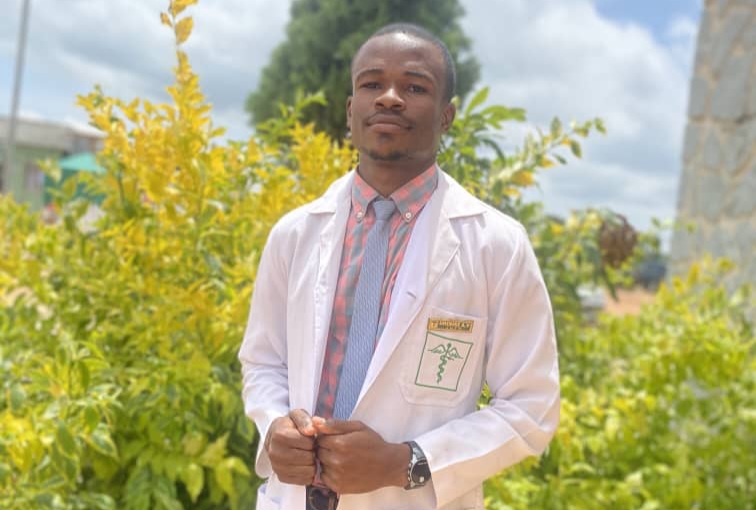INTERVIEW: Nigeria doesn’t reward academic excellence… I struggled financially in school — 2016 UTME joint-top scorer

Anonye Victory Emenike’s story is one that depicts the priority given to education in Nigeria, Africa’s most populous country.
In 2016, the graduate of Infant Jesus Academy (IJA) in Jos, Plateau state, was named the joint-top scorer in the United Tertiary Matriculation Examination (UTME).
He scored 359 alongside Akenbor Adesuwa Osarugue in the exam conducted annually by the Joint Admissions and Matriculation Board (JAMB).
In countries where education is given the necessary attention, Emenike — now a 600-level medicine and surgery student at the University of Jos (UNIJOS) — should have gotten scholarships and other rewards for his heroics in the UTME.
But the reverse was the case as he struggled financially through medical school.
In this interview with CrispNG, the 2016 UTME joint-top scorer reflects on his struggles in school and plans for the future.
CrispNG: What has changed for you since you emerged as the UTME joint top scorer in 2016?
Personally, growing up as a quiet, introverted person and socially awkward most of the time, I have learned to relate better, meet new friends and build meaningful connections.
CrispNG: You spoke about not being recognised in a recent interview, can you elaborate on that?
Generally, I believe that there is a need for recognition and reward for excellence across all areas of endeavour. Therefore, rewarding students for their academic achievements goes a long way in building their morale and motivation. This also helps other students to be encouraged and to strive even harder to reach their academic potential.
CrispNG: Do you think you were treated unfairly in terms of receiving due recognition and appreciation?
I can’t really say, but I strongly believe that by appreciation, we make excellence in others our priority. And when people are appreciated and rewarded for good work, they tend to do more and perform even better than before.
CrispNG: What struggles do you face as a medical student?
They are many. From the very start of studying medicine, finance has always been a struggle for me; from paying the not-so-affordable tuition fees to buying expensive textbooks to securing an accommodation etc. For me, the course is demanding, capital-intensive and takes a long time to complete. I consider it as “a course meant only for the rich”. Also, as a medical student, I am expected to know and memorize all information and terms related to medicine and surgery until I literally turn myself into a human medical encyclopedia.
Again, growing up as an introvert and going into medical school and realizing that you have to relate and create rapport with patients so as to obtain clinical information from them was an arduous task for me, but with practice, I am becoming better. There are also unending courses, workload and information overload, dissecting cadavers, night calls and the pattern of setting test and exam questions; the negative and close marking system.
CRISPNG: Would things have been different if you received a recognition?
I believe so. Receiving recognition would have made a whole lot of difference in a sense that it would have made life in medical school a lot more easier, enjoyable, efficient and satisfying for me. It would have lifted a lot of financial burdens associated with medical studies and eliminated many distractions. It would have given me more time to focus more on my studies. Receiving recognition would have significantly and positively correlated with excellent grades, eventually.
CRISPNG: Do you think you’ll finish top of your class?
I’m not certain, but it doesn’t seem impossible.
CrispNG: How best do you think best brains like you can be encouraged and motivated?
We can be encouraged through the provision of opportunities for success, offering rewards for academic feats, creating safe, supportive, friendly and threat-free environment for learning and using positive competition to motivate and drive students to try harder and work to excel.
CRISPNG: What other achievements have you had since becoming JAMB’s 2016 joint top scorer?
I have held leadership positions through which have been able to impact lives. I was an academic coordinator from (2017-2019) and I was able to help students learn course materials deeper and better, instilled discipline, encouraged active participation of all students, and lessen the learning workload through topic distribution among students.
Since 2020 till date, I have been serving as Medical Outreach Coordinator and I help in organising various medical outreach programs in markets, villages, secondary schools and bus parks where peculiar health needs of the people were met. Currently, I’m aspiring for the Federation of Igbo Medical and Dental Students Association- Unijos Chapter (FIMDSA) President and hope to impact more lives through the platform.
CrispNG: What are your plans for the future?
I plan to become a doctor. Get married and have kids. Do my residency program and specialise in dermatology in the USA. Make money, invest money. Build a healthcare service business here in Nigeria. Write books. Travel around the world. Be completely involved in politics as it is said to be, “medicine practiced on a large scale”, inspire the next generation, and build a legacy, something enduring that can be passed on.
CrispNG: Do you plan to stay back in Nigeria or you are considering “Japa’?
No, I don’t have any plans of staying back.
CrispNG: What’s your advise to young Nigerians out there?
My appeal to all Nigerians, especially the young Nigerians is to live your life the way you want to live it. Love and believe in yourself. Do that which you have passion for and enjoy doing. Love how you do it. Trust the process. Surround yourself with people you want to be around with– people who uplift you higher. And finding satisfaction and fulfilment in your success.





